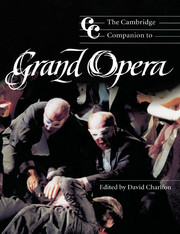Book contents
- Frontmatter
- 1 Introduction
- Part I The resourcing of grand opera
- 2 The ‘machine’ and the state
- 3 Fictions and librettos
- 4 The spectacle of the past in grand opera
- 5 The chorus
- 6 Dance and dancers
- 7 Roles, reputations, shadows: singers at the Opéra, 1828–1849
- Part II Revaluation and the twenty-first century
- Part III Grand operas for Paris
- Part IV Transformations of grand opera
- Notes
- Select bibliography
- Index
2 - The ‘machine’ and the state
from Part I - The resourcing of grand opera
Published online by Cambridge University Press: 28 November 2011
- Frontmatter
- 1 Introduction
- Part I The resourcing of grand opera
- 2 The ‘machine’ and the state
- 3 Fictions and librettos
- 4 The spectacle of the past in grand opera
- 5 The chorus
- 6 Dance and dancers
- 7 Roles, reputations, shadows: singers at the Opéra, 1828–1849
- Part II Revaluation and the twenty-first century
- Part III Grand operas for Paris
- Part IV Transformations of grand opera
- Notes
- Select bibliography
- Index
Summary
‘A machine so complicated as the [Paris] Opéra is like a maze: only people with long and profound acquaintance with the house can find their way through it.’ So wrote J.-T. Merle in De l'Opera in 1827. The truth is that no artistic enterprise before the creation of cinema could match grand opera in complexity; no mode of artistic production was comparable with what this theatre offered in uniting all the material and human factors that make up an operatic production, and to create the conditions necessary for its performance. It is no denial of the importance of creativity to assert that grand opera was the product of technology, albeit in a very wide sense of the term.
Grand opera developed and became a significant factor in European culture thanks to the power of this technology. For a more comprehensive understanding of this particular variety of opera, it is therefore necessary to describe the ‘machine’ in all its economic and political ramifications (that is to say, its ramifications in Parisian life and its relations with the French state) and also its cultural and moral ramifications (especially with censorship). In the nineteenth century, opera became the vehicle for both aesthetic and moral values indissolubly linked with the environment from which they sprang. Grand opera was born and grew up within a particular historical, institutional and legislative situation.
- Type
- Chapter
- Information
- The Cambridge Companion to Grand Opera , pp. 19 - 42Publisher: Cambridge University PressPrint publication year: 2003
- 1
- Cited by



